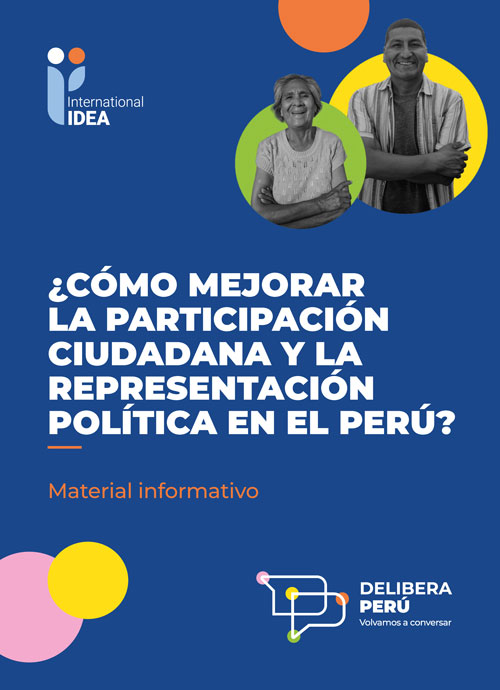In 2015 the United Nations member states adopted the ambitious Sustainable Development Goals (SDGs), to be achieved by 2030, including SDG 16, on peaceful, just and inclusive societies.
Search
Region
Country
Type
The Inter American Press Association (IAPA) and International IDEA urged U.S. President Joe Biden to discuss press freedom and freedom of expression in the Summit for Democracy to be held virtually this week among leaders of 110 countries.
Este artículo está disponible en español.
December 1, 2021
Member States of International IDEA commit to strengthen democratic governance in a statement for the Summit for Democracy hosted by U.S. President Joe Biden
La Sociedad Interamericana de Prensa (SIP) e IDEA Internacional exhortaron al presidente de Estados Unidos, Joe Biden, a que incluya la discusión sobre las libertades de prensa y expresión en la Cumbre por la Democracia que se celebrará esta semana en forma virtual entre líderes de 110 países.
El 1 de diciembre de 2021, el Consejo de Estados Miembros de IDEA Internacional (presidido por Australia) aprobó por unanimidad la solicitud de membresía de la República de Estonia. Estonia se une a la organización como su 34º Estado miembro.
As part of the webinar series entitled Conversations on Innovative Constitutional Design Options, International IDEA’s Constitution-Building Programme hosted on 25 November 2021 an expert panel to discuss the role of Constitutional Media Commissions and their role in enabling media freedom, ensuring balanced media coverage, and addressing contemporary challenges of dis/misinformation, with case-studies from Armenia, Ghana, Poland and Tunisia.
The 2021 Summit for Democracy is a unique opportunity to remind us that democracy is “government of the people, by the people, for the people”.
On 1 December 2021, International IDEA’s Council of Member States appointed five new Members to the Institute’s Board of Advisers for three-year terms from January 2022 to December 2024.
El 1 de diciembre de 2021, el Consejo de Estados Miembros de IDEA Internacional nombró a cinco nuevos miembros para la Junta de Asesores del Instituto por períodos de tres años desde enero de 2022 hasta diciembre de 2024.
On 1 December 2021, International IDEA’s Council of Member States (chaired by Australia) unanimously approved the membership request from the Republic of Estonia. Estonia joins the organization as its 34th Member State.
Elections are the cornerstone of democratic political processes, serving as a mechanism for political parties or candidates to compete for public office under equal conditions before the electorate. For an election to be credible, the competition must be fair, requiring impartial management of the process. As described in International IDEA’s Handbook on Electoral Management Design (Catt et al.
The 2021 Women Constitution-Makers’ Dialogue focused on comparative experiences with constitutions, customary and religious law, and gender equality.
Timor-Leste is deep into preparations for the upcoming presidential elections, anticipated in March 2022. Given the ongoing global Covid pandemic, the country’s two electoral management bodies (EMBs)—the Technical Secretariat for Electoral Administration (STAE) and the National Commission on Elections (CNE)—are working to revise internal regulations and procedures to support Covid-safe elections.
El domingo pasado, 21 de noviembre, se realizó en Chile la elección presidencial, parlamentaria y de Consejeros Regionales (CORES). En concreto se escogieron 155 diputados, 27 senadores (la mitad del Senado) y 302 CORES a lo largo de todo el territorio nacional y los dos cantidatos que pasaron a segunda vuelta presidencial que se definirá el 19 de diciembre.
Recent declines in democracy have undermined some of the remarkable progress made in Africa over the past three decades, although bright spots remain. The Covid-19 pandemic, though seemingly less damaging to public health than elsewhere in the world, has added pressure on governance, rights, and social inequality. The report also covers the Middle East and North Africa which is one of the least democratic regions in the world.
For more than a decade, a majority of Europe’s established democracies have seen the quality of their democracies stagnate—or even decline—rather than improve. Some show the clear erosion of democratic processes and fundamental rights; several have deteriorated to the point where they can hardly be qualified as democracies any longer. The arrival of the Covid-19 global health crisis has added to the strain.
The number of democracies in the Americas remains the same as two years ago despite the Covid-19 pandemic. In addition, most of the democracies in the region demonstrated great resilience in the face of the pandemic. Parliaments, the judiciary and the media of most democracies in the region managed to adapt and continue to exercise their control functions, even in the midst of numerous restrictions that hampered their work.
Democracy is at risk. Its survival is endangered by a perfect storm of threats, both from within and from a rising tide of authoritarianism.
The Covid-19 pandemic initially broke out in the Asia and the Pacific region in late 2019, with the first cases in Wuhan, China. The pandemic has served as a magnifier of pre-existing democratic strengths and weaknesses within governing systems around Asia and the Pacific. In the majority of cases, the region’s hybrid and authoritarian regimes tightened their grip on society in response to the pandemic. Quality of democracy continued to decline in number of region’s democracies.
Democracy is at risk. Its survival is endangered by a perfect storm of threats, both from within and from a rising tide of authoritarianism. The Covid-19 pandemic has exacerbated these threats through the imposition of states of emergency, the spread of disinformation, and crackdowns on independent media and freedom of expression.
